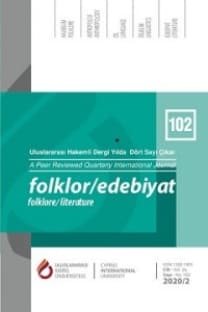Feminist Çeviri Bakış Açısıyla Kadın Sorunları: Sylvia Plath ve “Anneler”
sylvia Plath, feminist çeviri, anneler, Gideon Toury, betimleyici çeviri araştırmaları, Luise von Flotow
Woman Issues from the Perspective of Feminist Translation: Sylvia Plath and ‘‘Mothers’’
Sylvia Plath, descriptive translation studies, Luise von Flotow, feminist translation, Mothers,
___
- Bassnett, S. (2005). Sylvia Plath - An introduction to the poetry. Palgrave Macmillan. Blank, H. (2008). Bekâretin “El değmemiş” tarihi (E. Ergün, Trans) İletişim.
- Bozkurt, S. (2014). Touched translations in Turkey: A feminist translation approach. Moment Journal, 1(1), 104–124. https://doi.org/10.17572/mj2014.1.104124
- Castro, O., and Ergün, E. (2017). Feminist translation studies: Local and transnational perspectives. Routledge.
- Castro, O., Ergün. E., von Flotow. L., Spoturno, M. L. (2020). Towards transnational feminist translation studies. Mutatis Mutandis. Revista Latinoamericana de Traducción, 13(1), 2-10. doi: 10.27533/udea.mut.v13n1a01
- Chaves Petersen, M. (2019). Female relationships, motherhood, and loss of language in The Bell Jar and “Mothers”. Plath Profiles, (11), 1, 57-74.
- Delabastita, D. (1993). There’s a double tongue: An Investigation into the Translation of Shakespeare’s Wordplay, with Special Reference to Hamlet. Rodopi.
- Ergün, E. (2017). Translational beginnings and origin/izing stories: (Re)writing the history of the contemporary feminist movement in Turkey ( In L. von Flotow, & F. Farahzad, Ed.) Translating women: Different voices and new horizons, Routledge, 41-55.
- Ergün, E. (2013). Reconfiguring translation as intellectual activism: The Turkish feminist remaking of virgin: The untouched history. Trans-Scripts, 3, 264-289.
- Ergün, E. (2010a). Bridging across feminist translation and sociolinguistics. Language and Linguistics Compass, 4(5), 307–318. https://doi.org/10.1111/j.1749-818X.2010.00208.x
- Ergün, E. (2010b). Dismantling virginity: Social, medical, and legal control of female sexualityin Turkey. LAP.
- Godard, B. (1989). Theorizing feminist discourse/translation. Tessera, 6, 42-53. https://tessera.journals. yorku.ca/index.php/tessera/article/view/23583
- Irigaray, L. (1985). This sex which is not one (C. Porter , Trans.) Cornell University.
- Kuleli, M. (2019). Marxist feminist discourse in a Turkish novel with Eugene Nida’s concept of “equivalence” applied on translation evaluation of the novel. RumeliDE Dil ve Edebiyat Araştırmaları Dergisi, (16), 703-720. https://doi.org/10.29000/ rumelide.621178
- Plath, S. (2015). Anneler. Johnny Panic ve Rüyaların Kutsal Kitabı (O. Boynudelik, Çev.) Kırmızı Kedi.
- Saki Demirel, A. and Tarakcıoğlu, A. Ö. (2019). Feminist translation practices in Turkey: The case of the feminist websites 5Harfliler and çatlak zemin. RumeliD
- Simon, S. (1996). Gender in translation: Cultural identity and the politics of transmission. Routledge. Steinberg, P. K. (2004). Great writers Sylvia Plath. Chelsea House.
- Toury, G. (1995). Descriptive translation studies and beyond. John Benjamins. Wagner-Martin, L. (2003). Sylvia Plath a literary life. Palgrave Macmillan.
- Wallmach, K. (2006) Feminist translation strategies: Different or derived?, Journal of Literary Studies, (22)1-2, 1-26. https://doi.org/10.1080/02564710608530388
- Vinay, J.P. and Darbelnet, J. (1995) Comparative stylistics of French and English (Translated and edited by J.C. Sager & M-J. Hamel) John Benjamins.
- von Flotow, L. (1991). Feminist translation: Contexts, practices and theories. TTR: Traduction, Terminologie, Rédaction, 4(2), 69-84. https://doi.org/10.7202/037094ar.
- Wagner-Martin, L. (2003). Sylvia Plath a literary life. Palgrave Macmillan.
- Wallmach, K. (2006) Feminist translation strategies: Different or derived?, Journal of Literary Studies, (22)1-2, 1-26. https://doi.org/10.1080/02564710608530388.
- Vinay, J.P. and Darbelnet, J. (1995) Comparative stylistics of French and English (Translated and edited by J.C. Sager & M-J. Hamel) John Benjamins.
- von Flotow, L. (1997). Translation and gender: Translating in the ‘era of feminism’. St Jerome.
- von Flotow, L. (1991). Feminist translation: Contexts, practices and theories. TTR: Traduction, Terminologie, Rédaction, 4(2), 69-84. https://doi.org/10.7202/037094ar.
- Electronic resources: Plath, S. (2016). Mothers. Johnny Panic and the Bible of Dreams. Harperperennial. 05.01.2021.https:// www.amazon.com/Johnny-Panic-Bible-Dreams-Sylviaebook/dp/B01KT1845W
- ISSN: 1300-7491
- Yayın Aralığı: 4
- Başlangıç: 1994
- Yayıncı: -
Erken Cumhuriyet Dönemi Kadın Dergilerinde Kadın İmajı: Ev Kadın Dergisi Örneği
Feminist Çeviri Bakış Açısıyla Kadın Sorunları: Sylvia Plath ve “Anneler”
Kuzey Kıbrıs’ta Süregelen Cinsiyetlendirilmiş Ebeveynlik
Beypazarı’nda Kadının Ev İçi Emeğinin Dönüşümü: Deneyim ve Aktarım
Ev Kurarak Güçlenmenin İmkânları
Cinsiyete Dayalı İşbölümü Bağlamında ‘Bayan Orkestra’ Pratiği: DJ Cannur Örneği
Mantıktan İdealize Edilmiş Kadın İmgesine: Halide Edip’in Çaresaz’ı
Le Guin’in Karanlığın Sol Eli Romanında Ataerkiye Meydan Okuma
Tween/Eşikergen Jargonu ‘‘Mean Girls’’ ve Güzellik Zorbalığı
